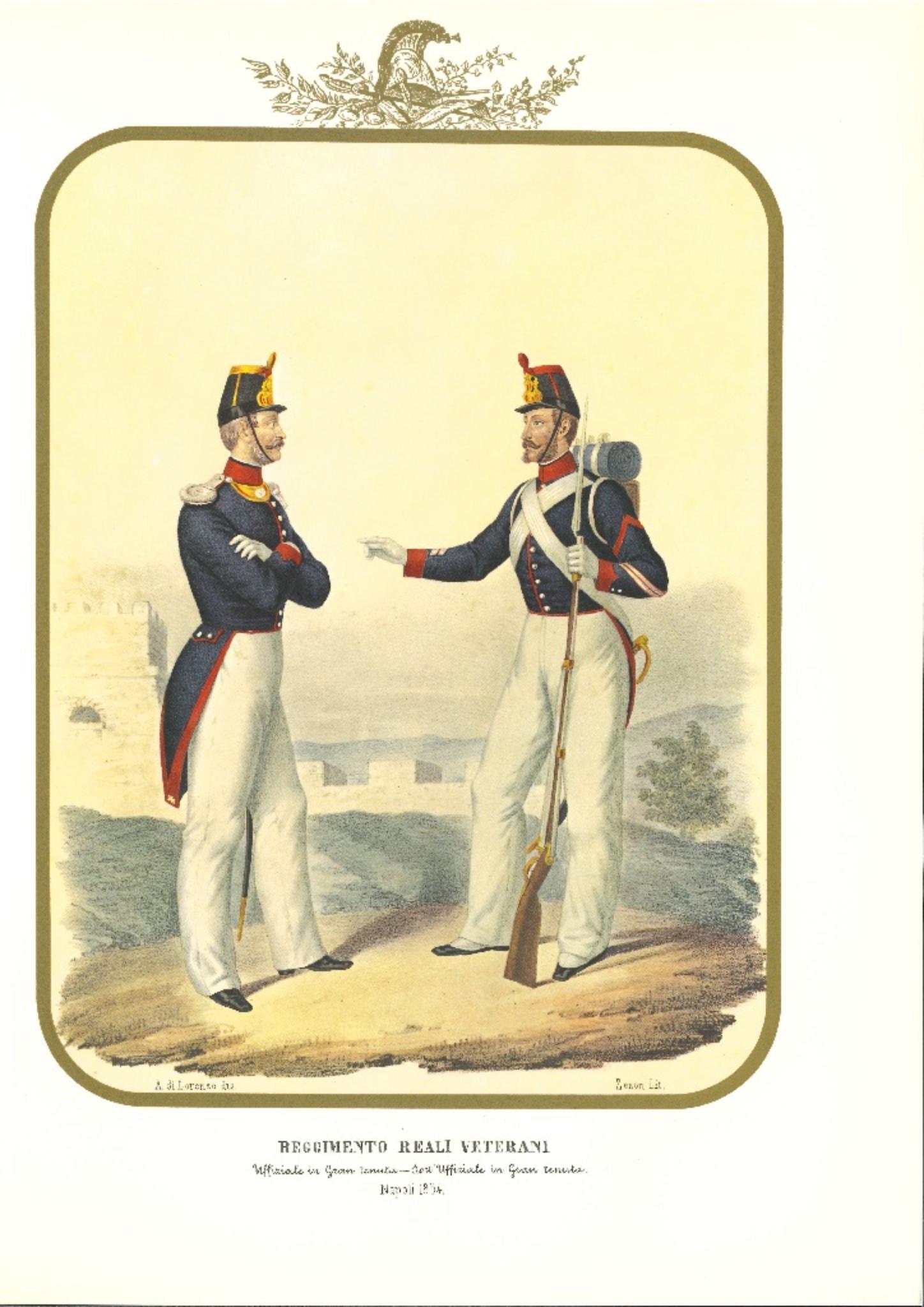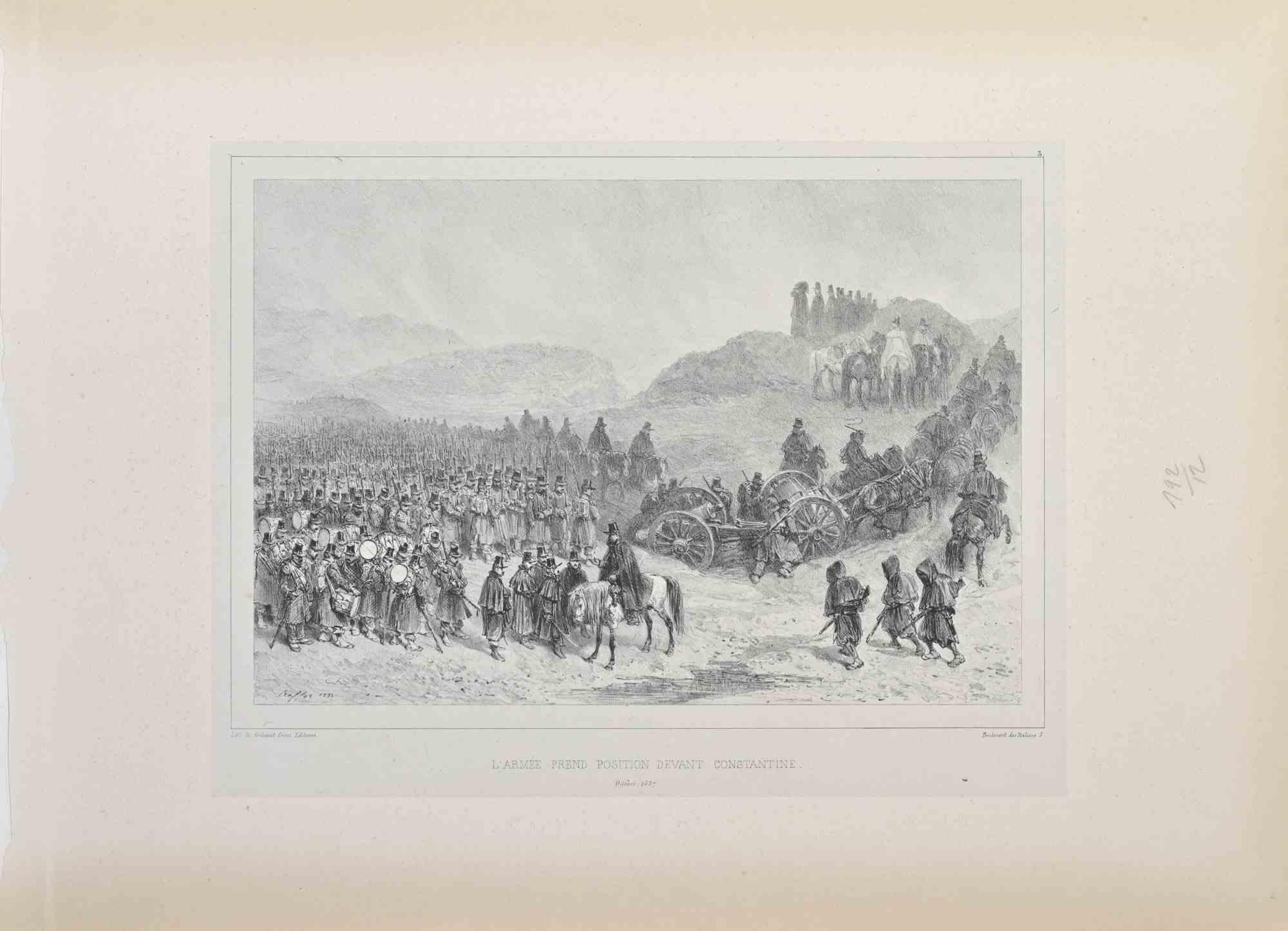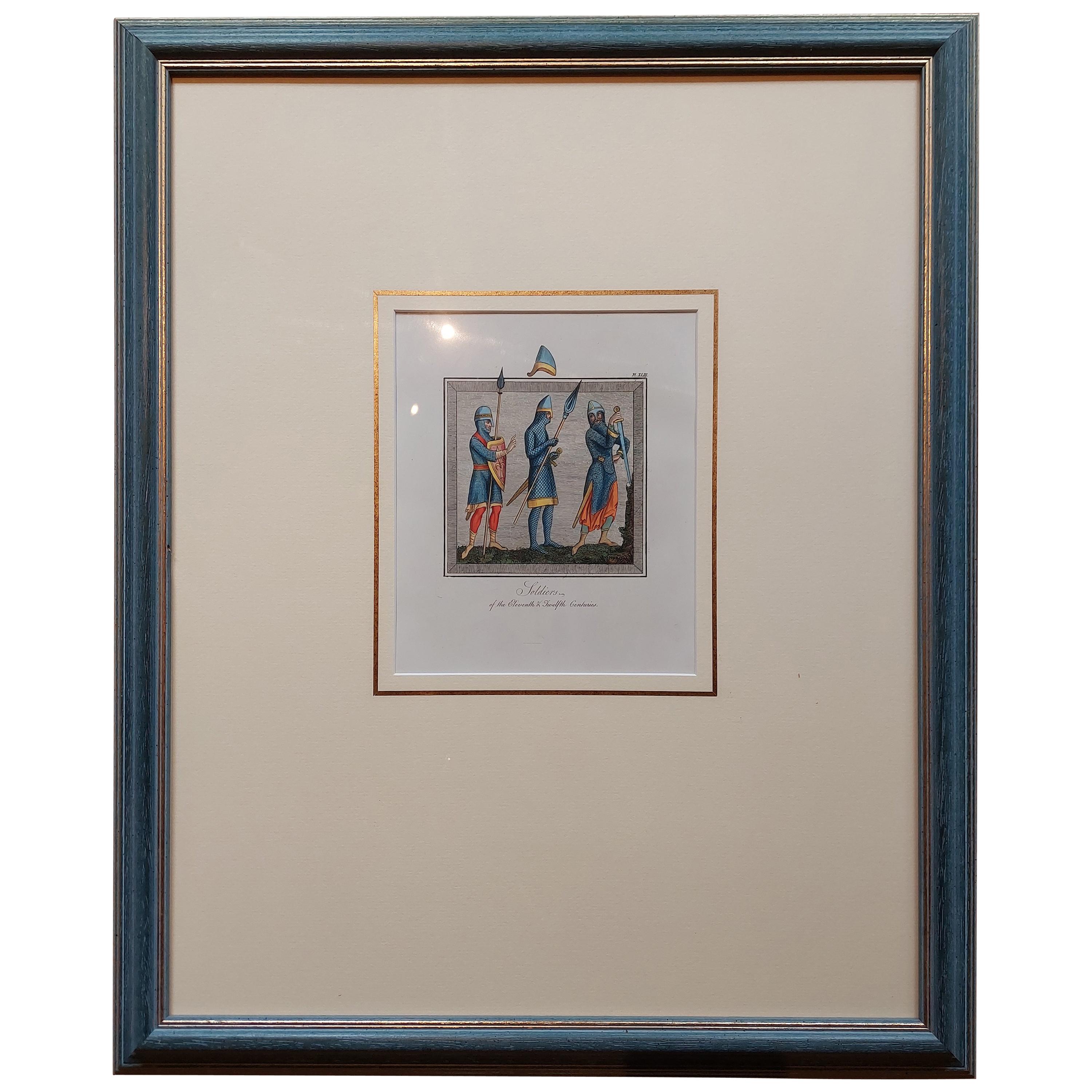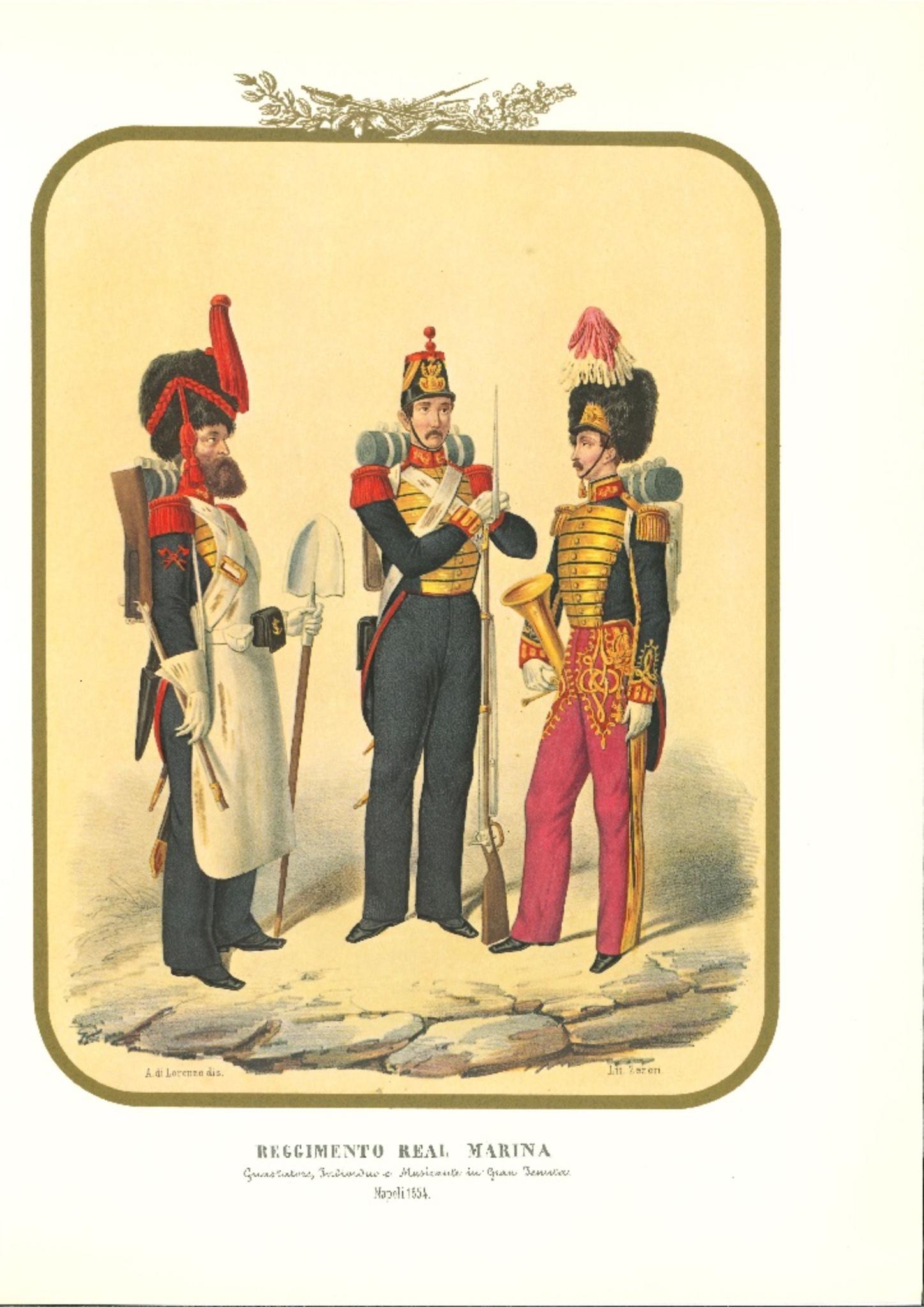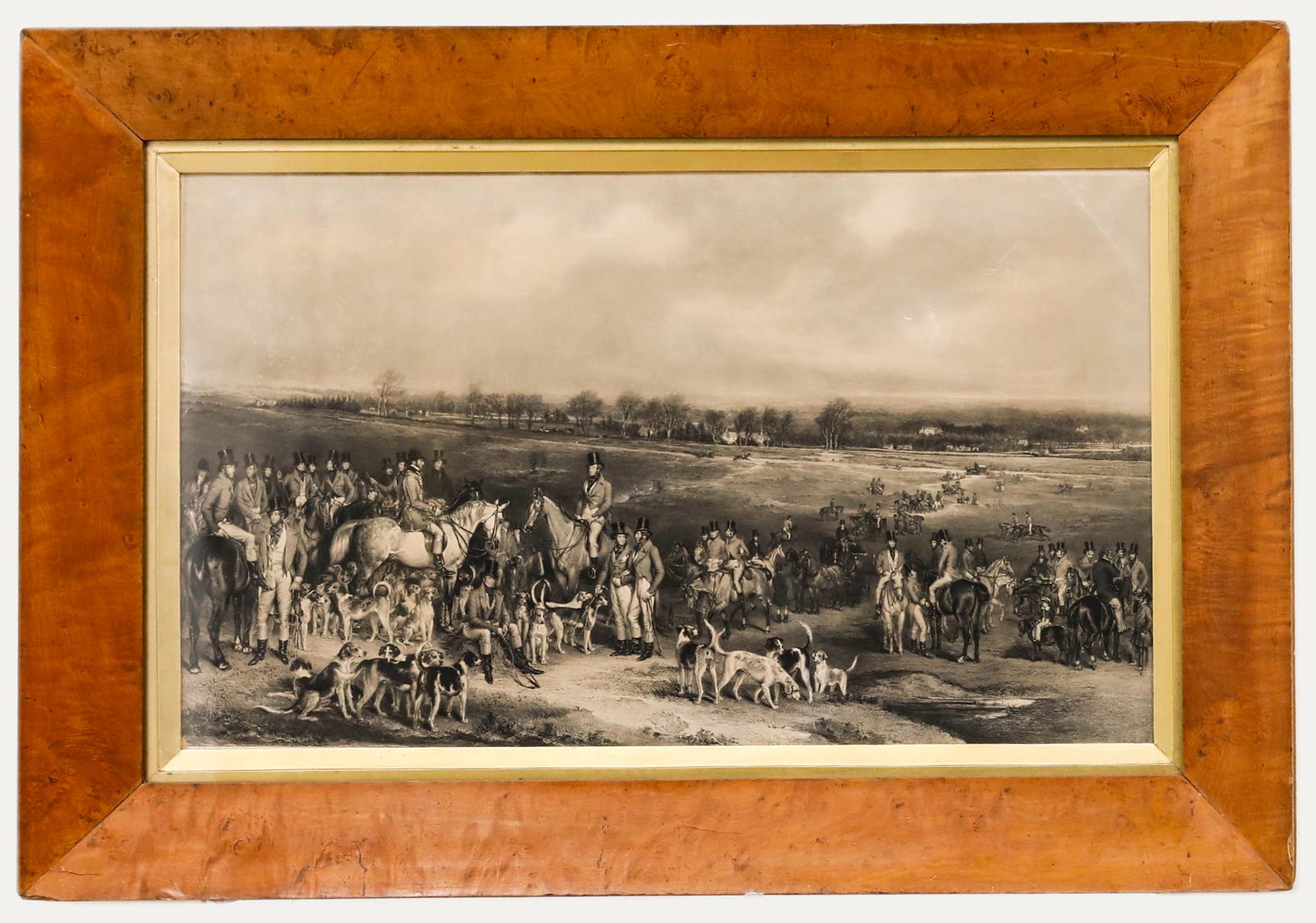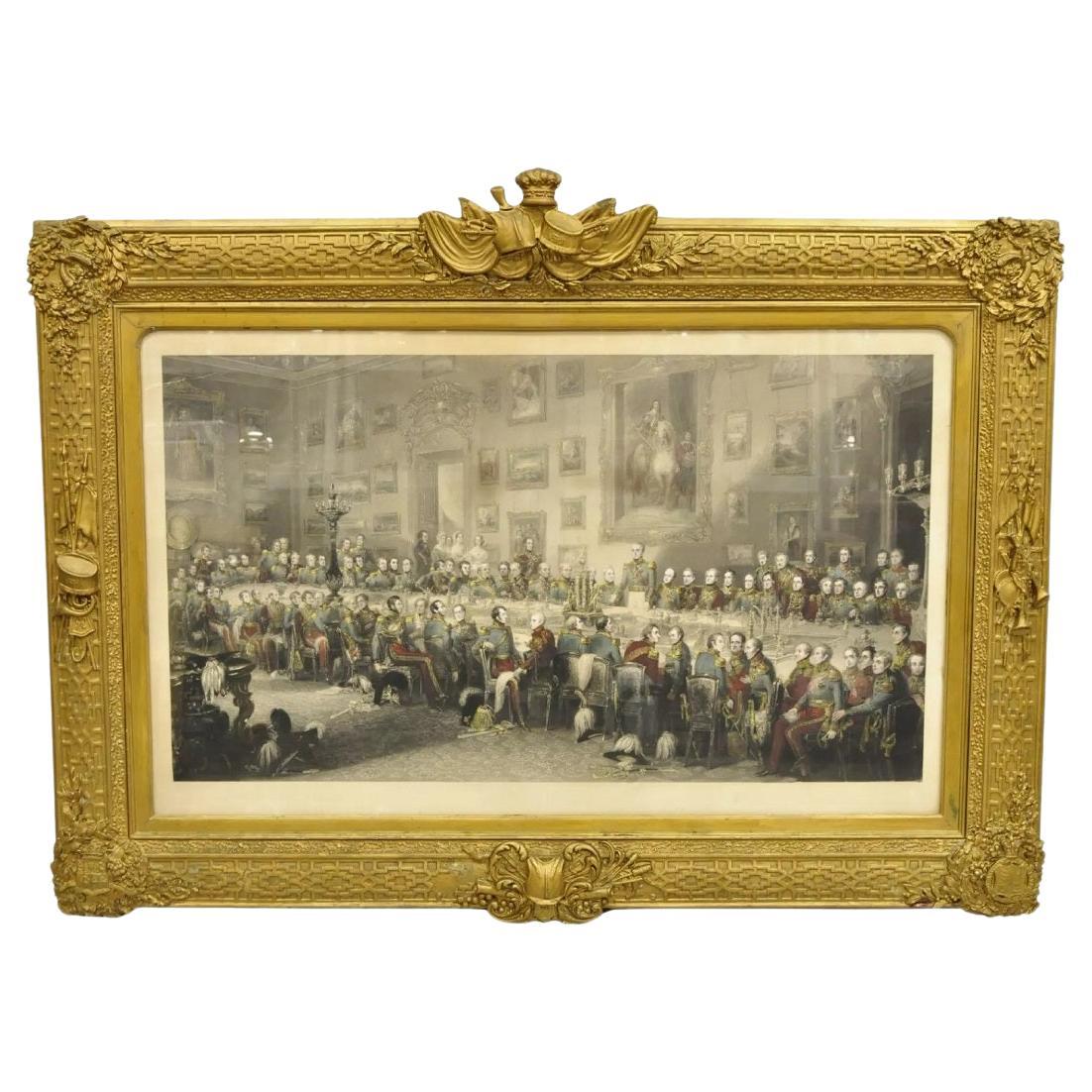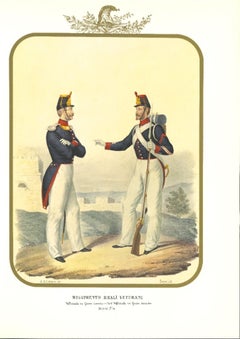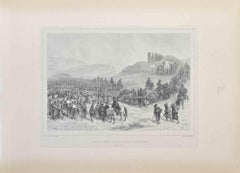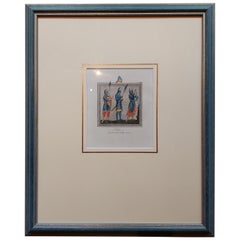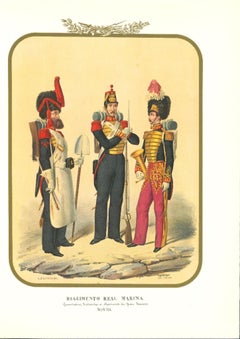Articles similaires à « Waterloo Volunteers » De la suite « History of England »
Vous voulez plus d'images ou de vidéos ?
Demander au vendeur plus d'images ou de vidéos
1 sur 11
Graham Clarke« Waterloo Volunteers » De la suite « History of England »1985
1985
701,76 €
À propos de cet article
This artwork titled "Waterloo Volunteers" from the suite "History of England" is an original color etching by British artist Graham Clarke, b.1941. It is hand signed, titled and numbered 69/200 Ed.A in pencil by the artist. The image (plate mark) size is 17 x 13.5 inches, framed size is 24.35 x 21.25 inches. Custom framed in an antique style wood veneer frame with off white matting. Elle est en excellent état.
About the artist:
Graham Clarke, artist, author, illustrator and humorist, is one of Britain's most popular and best-selling printmakers. He has created some five hundred images of English rural life and history and of the Englishman's view of Europe. Born in 1941, Clarke's upbringing in the austerity of war-time and post-war Britain, made him reliant on his own imaginative resources. Responding to the comedy of everyday life, he brings his own unique brand of humour to his interpretation of past and present history through the eyes of the common man.
He was educated at Beckenham Art School, where he fell under the spell of Samuel Palmer's romantic and visionary view of the Shoreham countryside. At the Royal College of Art he specialised in illustration and printmaking, and pursued his interest in calligraphy. With encouragement from Edward Bawden, Clarke began refining an individual aesthetic, printing traditional landscapes marked by a sense of locality and genre. Graduating in 1964, he benefited from the print boom of the decade and, with commissions from Editions Alecto and London Transport Publicity Department a promising career was launched. The publication in 1969 of his first hand-printed "livre d'artiste", Balyn and Balan won recognition from the most influential patron and connoisseur of the day, Kenneth Clark. Lord Clark also wrote enthusiastically in praise of Vision of Wat Tyler: "the whole book is a splendid assertion that craftsmen still exist and cannot be killed by materialism. A few idealists are the only hope for decent values".
He has attracted universal admiration for his revival of beautiful, hand-coloured prints in the tradition of Thomas Rowlandson. The famous 'arched top' etchings, with which Graham Clarke established a widely successful reputation in Britain and overseas, came to public attention in 1973 when the first of these, Dance by the Light of the Moon, was exhibited in London at the Royal Academy of Arts Summer Show, and sold out
Examples of his work are held by Royal and public collections, including the Victoria and Albert Museum, the British Museum, the Tate Gallery and the National Library of Scotland in the United Kingdom, as well as by Trinity College, Dublin, the Library of Congress in Washington, D.C., the New York Public Library and the Hiroshima Peace Museum. Many more are to be found on the walls of private homes all over the world, collected systematically by devotees, as well as singly by ordinary art lovers who "know what they like". For over thirty five years Clarke has sustained a remarkable evolutionary development of his work, while remaining true to a philosophy of life and to a democratic ideal which he was already formulating as a schoolboy.
His books, Graham Clarke's "History of England", Graham Clarke's "Grand Tour" and "Joe Carpenter Son, An English Nativity", were published by Phaidon Press. The latter, a verse play, now having been performed more than 300 times in churches and schools worldwide. His 'discovery' of "W. Shakespeare Gent. His Actuale Nottebooke" saw the publication of a quite different work in 1992. This has been followed by "Engelskmann I Lofoten" a Norwegian Sketchbook in 1996. Spring 2000 saw the publication of 'Bait Box Stew', sketches and notes from his beloved Cornwall, and 'KENT', a collection of watercolours on his home territory.
At a ceremony in Canterbury Cathedral in July 1993, an Honorary Degree of Master of Arts was conferred upon Graham Clarke by the University of Kent and in August 1993 Graham was made a Chevalier de la Confrerie du Ceps Ardechois in his favourite part of Southern France. Graham was also named as the Fine Art Trade Guild Artist of the Year 1993. In 1999 he was asked to become an official ambassador for the County of Kent, a role which he pursues with much enthusiasm. For the last twelve years his work has taken him regularly to Japan where he has now become that country's most popular British artist. Kodansha, Japan's largest book publisher, issued "The World of Graham Clarke", an introduction and explanation of eighty Clarke etchings in Japanese, a second edition has now been printed.
Graham Clarke's Millennium window is to be seen in his own parish church of Boughton Monchelsea, Kent. It is unique in that it involves light and sound as well as the stained glass itself. During the year 2000 he produced a large composite wood carving 'The Gloucester Nativity'. Gloucester Cathedral is its home but it is designed to travel and forms the centrepiece at Clarke's retrospective exhibition held at The Royal Museum and Art Gallery, Canterbury in 2001.
Graham Clarke is a man with an overriding sense of tradition, and of religious, social and historical continuities. He takes pride in his view of himself as a local man, a "Man of Kent", with a firm faith in the peace and stability of family, home and community. As such, life and art have always been interdependent, mutually sustaining activities. His wife Wendy, his four children, his animals and friends, the cottage industry he maintains in the village of Boughton Monchelsea where he lives, his comedy band, and the surrounding landscape, offer a microcosm of the world and its history. The scenes he depicts represent both for him and for his everwidening audience, an idyll and a universal ideal.
- Créateur:Graham Clarke (1941)
- Année de création:1985
- Dimensions:Hauteur : 61,85 cm (24,35 po)Largeur : 53,98 cm (21,25 po)Profondeur : 2,54 cm (1 po)
- Support:
- Mouvement et style:
- Période:
- État:
- Adresse de la galerie:San Francisco, CA
- Numéro de référence:Vendeur : cla/wat/vol/011stDibs : LU66638714682
À propos du vendeur
5,0
Vendeur Platine
Vendeurs premium dont la note est supérieure à 4,7 et le délai de réponse de 24 heures maximum
Établi en 1999
Vendeur 1stDibs depuis 2017
851 ventes sur 1stDibs
Temps de réponse habituel : 1 heure
- ExpéditionRecherche du devis...Expédition depuis : San Francisco, CA
- Politique des retours
Certaines parties de cette page ont été traduites automatiquement. 1stDibs ne garantit pas l'exactitude des traductions. L'anglais est la langue par défaut de ce site web.
Garantie d'authenticité
Bien qu'il soit peu probable que la situation se présente, dans le cas où vous rencontreriez un problème d'authenticité d'un article, contactez-nous dans un délai d'un an pour obtenir un remboursement intégral. DétailsGarantie de remboursement
Si votre article n'est pas conforme à la description, est endommagé pendant le transport ou ne vous est pas livré, contactez-nous sous 7 jours pour obtenir un remboursement intégral. DétailsAnnulation sous 24 heures
Vous disposez d'un délai de 24 heures pour annuler votre achat sans motif.Des vendeurs professionnels agréés
Nos vendeurs de renommée mondiale doivent respecter des normes strictes en matière de service et de qualité, afin de préserver l'intégrité de nos fiches produit.Garantie d'alignement des prix
Si vous constatez qu'un autre vendeur a mis en vente le même article à un prix inférieur sur un autre site, nous nous alignerons sur ce prix.Livraison en toute confiance à l'international
Notre réseau de transporteurs de premier ordre propose des options d'expédition spécialisées dans le monde entier, y compris des livraisons personnalisées.Plus d'articles de ce vendeur
Tout afficherLa Parade
Par Michel Delacroix
Cette œuvre d'art intitulée "La Parade" 1978 est une lithographie originale de l'artiste français Michel Delacroix, né en 1933. Elle est signée à la main et numérotée 24/150 au crayo...
Catégorie
Fin du 20e siècle, Estampes - Figuratif
Matériaux
Lithographie
Groupe d'artisans
Par John Edward Costigan
Cette œuvre d'art intitulée "Group of Workers" 1943, est une lithographie originale sur papier de l'artiste américain John Edward Costigan, 1888-1972. Elle est signée et titrée au cr...
Catégorie
Milieu du XXe siècle, Réalisme, Estampes - Figuratif
Matériaux
Lithographie
Trois hommes combattant un forgeron
Par Sadao Watanabe
Cette œuvre, "Trois hommes défendant un fort" 1972, est un pochoir original en couleur sur du papier momigami froissé à la main. Elle est signée, datée et numérotée 5/20 à l'encre noire par l'artiste. La taille de l'œuvre d'art est de 26,5 x 22,5 pouces, la taille de l'encadrement est de 36 x 31,75 pouces. Il est encadré sur mesure dans un cadre en bois doré, avec un passe-partout en tissu et un intercalaire de couleur noire. Elle est en excellent état.
À propos de l'artiste :
Sadao Watanabe, né et élevé à Tokyo, était un graveur japonais du 20e siècle. Il était célèbre pour ses gravures bibliques réalisées dans la tradition mingei (art populaire) du Japon. En tant qu'élève du maître teinturier Serizawa Keisuke (1895-1984), Watanabe a été associé au mouvement mingei (art populaire).
Son père est mort quand Watanabe avait dix ans. Il a abandonné l'école à un âge précoce et est devenu apprenti dans une teinturerie. Une femme chrétienne de son quartier a invité le jeune orphelin de père à venir à l'église avec elle. À l'âge de dix-sept ans, Watanabe a reçu le baptême.
Le jeune Watababe travaillait dans des ateliers de teinture, dessinant des motifs et teintant des vêtements. En 1937, un an après la création du musée d'art populaire par Yanagi Soetsu...
Catégorie
Fin du 20e siècle, Moderne, Estampes - Figuratif
Matériaux
Pochoir
Hussard du Premier Empire, Paris
Par Gaston Tyco
Artiste : Gaston Tyco (Français, né en 1918)
Titre : Hussard du Premier Empire, Paris.
Année : Circa 1960
Moyen : Huile sur toile
Taille de la toi...
Catégorie
Milieu du XXe siècle, Impressionnisme, Peintures - Figuratif
Matériaux
Huile
« People Gathering », grande lithographie originale
Par Roy Carruthers
Cette œuvre d'art "People Gathering" c.1990 est une lithographie originale de l'artiste sud-africain Roy Carruthers, 1938-2013. Elle est signée à la main et porte l'inscription "Pres...
Catégorie
Fin du 20e siècle, Surréalisme, Estampes - Intérieurs
Matériaux
Lithographie
GP (expert général)
Par Charles Bragg
Cette œuvre d'art "GP (General Practitioner)" c.C. 1980 est une gravure originale de l'artiste américain Charles Bragg, 1931-2017. Elle est signée, titrée et numérotée 193/300 au cra...
Catégorie
Fin du 20e siècle, Autres styles artistiques, Estampes - Figuratif
Matériaux
Eau-forte
Suggestions
Royal Veterans Regiment - Lithographie d'Antonio Zezon - 1854
Par Antonio Zezon
Royal Veterans Regiment est une lithographie originale d'Antonio Zezon. Naples 1854.
Intéressante lithographie en couleur qui décrit certains membres de l'armée : Un officier et un ...
Catégorie
années 1850, Moderne, Estampes - Figuratif
Matériaux
Lithographie
L'armée prend position - Lithographie d'Auguste Raffet - 1837
L'armée prend position est une lithographie réalisée par Auguste Raffet en 1837.
Signée sur la plaque.
Bon état
Catégorie
années 1830, Moderne, Estampes - Figuratif
Matériaux
Lithographie
Impression ancienne de soldats des 11e et 12e siècles par Strutt (1842)
Impression ancienne intitulée "Soldats des onzième et douzième siècles". Impression ancienne originale de Soldats du 11ème et 12ème siècle. Cette gravure provient de "Illustration fo...
Catégorie
Antiquités, Milieu du XIXe siècle, Estampes
Matériaux
Papier
400 € Prix de vente
20 % de remise
Le Second Royal Navy Regiment - Lithographie d'Antonio Zezon - 1854
Par Antonio Zezon
Second Royal Navy Regiment est une lithographie originale d'Antonio Zezon. Naples 1854.
Intéressante lithographie en couleur décrivant le régiment de la Royal Navy : on y voit un sa...
Catégorie
années 1850, Moderne, Estampes - Figuratif
Matériaux
Lithographie
Grant d'après Thomas Lupton - gravure, rencontre des chiens de cerfs de sa Majesté
Cette œuvre d'art monochrome représente une scène de chasse animée, avec un grand groupe de cavaliers à cheval accompagnés de nombreux chiens au premier plan d'un vaste paysage rural...
Catégorie
XIXe siècle, Estampes - Figuratif
Matériaux
Gravure
Gravure encadrée de William C.I.C. "The Waterloo Banquet at Apsley House" (Le banquet de Waterloo à Apsley House)
"Anglais, milieu du 19e siècle. "Le banquet de Waterloo", d'après William Salter (anglais, 1804-1875), gravé par Wm. Greatbach, imprimé par McQueen, représentant une scène de banque...
Catégorie
Antiquités, Milieu du XIXe siècle, Inconnu, Victorien, Peintures
Matériaux
Gesso, Verre, Bois, Papier
